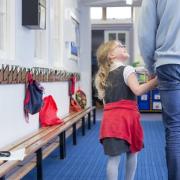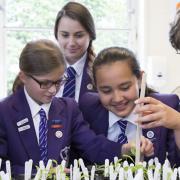How do you best help your child to make the most of their education, but avoid being too pushy a parent?

It goes without saying that every parent wants the best for their child, but how can a parent make sure their child gets the most from their education?
According to Alexander Mitchell, head at Holmwood House preparatory school in Colchester, the answer may lie closer to home than you think. His approach is surprisingly accessible and practical: make sure they get a good night’s sleep, control their screen time and monitor their diet. His is a far (and welcome cry) from the hothousing, stressful approach that is all too easy to employ.
Alexander is confident that if a child is content, healthy and encouraged, they will flourish. Alexander is also of the opinion that parents should steer clear of comparing their child to other children.

‘Children are unique; they grow and develop at different rates and there is no definitive road map,’ he says. ‘Parents need to be realistic about their children. Some children are slow burners, late starters, academic superstars, sporting prodigies, middle runners, outliers, social whirls and so on.’
But this is not to say a parent’s roll in their child’s education is passive. Emma Jones from Maldon Court School thinks that supporting your child from home is ‘fundamental’ to developing confidence within the classroom. Take English, for example. The majority of parents (myself included) breathe a sigh of relief when their children’s reading eventually takes off. I for one have more or less left my own confident reader to his own devices when it comes to reading books at home. But Emma believes that children should be listened to well into upper Key Stage 2 (that is 10 and 11 year olds) and that parents shouldn’t stop reading to their children. Bedtime stories should not remain the preserve of toddlers, but instead we should try and foster a life-long love affair with books for our children, particularly in an age where technology holds so much sway.
‘Reading out loud with your children encourages discussion about the texts being read, the characters involved and the themes being portrayed, which in turn allows children to feel greater confidence when taking part in class discussions and interacting within a group,’ says Emma.

Equally, parents shouldn’t be tempted to rest on their laurels when a set of times tables has been learnt. ‘The new curriculum places a greater emphasis on a child’s ability to recall number facts,’ says Emma, ‘including the times tables and the associated division facts, prime, square and cubed numbers as well as the connection between fractions, decimals and percentages, so instant recall of these facts goes a long way when applying the necessary information in problem solving situations.’
The same can be said of the new curriculum’s emphasis on spellings. We need to keep closer tabs on our children than we may have previously thought. After a nine-week summer holiday, my own little bright spark had forgotten some fairly basic spelling rules, and this is hardly surprising. Punctuation and grammar, though taught as early as Year 1, can still catch children out in Year 4, as I have recently come to understand. In short, Emma explains: ‘I strongly believe that the support, repetition and revision that is consolidated at home plays a significant part in building the platforms children need to reach the next step in their educational career.’
More specifically modern language learning can be supplemented by various apps (such as Memrise and Quizlet) as well as trips abroad, explains Miriam Gimenez from Queenswood School near Hatfield. ‘Because speaking remains the most difficult skill to practice, residential trips offer the ideal opportunity to develop a budding linguist’s practical speaking skills, as well as offering real life experience and inspiration.’

At Queenswood, overseas trips to Italy, Spain, France and Japan are organised from Year 7 and at home, Miriam recommends the websites www.penpalworld.com and www.bbc.co.uk/schools/gcsebitesize. The latter offers foundation and higher-level reading, listening, speaking and writing practice. The website is surprisingly simple to use and can help adults brush up on their own French, German or Spanish too.
And what about the arts? According to Sion Parry, director of music at Ipswich school, experimenting and listening to various different styles of music with your child is invaluable when it comes to encouraging pupils to appreciate this area of study. It doesn’t matter what form of music you are listening to – a song on the radio, a film soundtrack or a live classical music concert – professional music inspires young ears.
Sion says: ‘We always want to make music lively and fun. In the classroom here, pupils have the opportunity to explore a wide variety of genres and instruments, from orchestral pieces to samba, so that pupils don’t have to be expert musicians in order to make great music. For our advanced musicians, there is access to high quality, specialist teaching, and the chance to join some of our top ensembles, such as our chapel choir, chamber orchestra and big band.’

When it comes to supporting your child who is learning a musical instrument, a little practice every day (15 minutes is recommended) is preferable to one, long sporadic session – usually in a panic just before a lesson. And if that violin note sounds like fingernails down a chalkboard, don’t show your despair – always encourage any efforts on their part. If there is a choir on offer at your child’s school, urge them to take part, even if they do have to give up their lunchtime play or get up ten minutes earlier.
It seems that gentle encouragement is at the centre of it all, something all mums and dads can play a part in without turning into pushy parents. To quote Alexander once more, we may do well to ‘embrace the process of education and not the product’. He encourages parents not to answer their child’s questions with answers. but to answer them with questions.
‘Remove the spoon from the learning process and encourage children to enjoy the struggle that learning sometimes presents,’ he adds. ‘All of this needs us all, parents and schools, to create the right environment, guidance and support.’
It would appear that a rounded approach is the best way to support our children’s education. A balanced diet at home of nurture, study, media control and sleep will set them on the best path for their future learning journey.
Get in touch
Maldon Court Preparatory School
Silver Street, Maldon, Essex, CM9 4QE, 01621 853529, www.maldoncourtschool.org
Holmwood House School
Chitts Hill, Lexden, Colchester, Essex, CO3 9ST, 01206 574305, www.holmwood.essex.sch.uk
Queenswood School
Shepherds Way, Hatfield, AL9 6NS, 01707 602500, www.queenswood.org
Ipswich School
25 Henley Road, Ipswich, IP1 3SG, 01473 408300, www.ipswich.suffolk.sch.uk

























